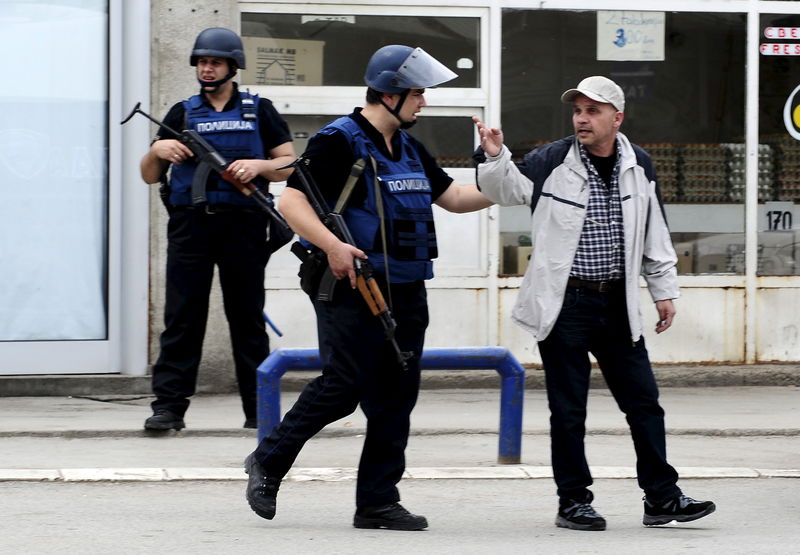By Ognen Teofilovski
KUMANOVO, Macedonia (Reuters) - Five police officers died and dozens were wounded in a daylong gun battle in an ethnic Albanian suburb of northern Macedonia on Saturday, adding the threat of armed conflict to a deep political crisis rocking the ex-Yugoslav republic.
The Balkan country's interior ministry said an unspecified number of gunmen were also killed, but that it had no information on civilian casualties during clashes that began before dawn and stretched into the evening.
Police said that acting on information about an "armed group" they had launched an operation in an ethnic Albanian district of the northern town of Kumanovo 40 km (25 miles) north of the capital Skopje. The region saw heavy fighting during an ethnic Albanian insurgency in 2001.
Units of special police in armoured vehicles locked down the neighbourhood and helicopters circled overhead. A Reuters photographer reported hearing heavy automatic gunfire and loud explosions. Black smoke rose over the town and residents were seen leaving the area carrying belongings.
The events will deepen concern in the West over stability in Macedonia, where the government is on the ropes over allegations by the main opposition, the Social Democrats, of illegal wire-tapping and widespread abuse of office.
Protesters demanding the resignation of conservative Prime Minister Nikola Gruevski clashed with police this week and the opposition is threatening to rally thousands on May 17.
Observers fear political leaders on either side may try to stoke ethnic tensions as leverage.
"DARK SCENARIO"
"The situation on the ground remains highly critical," Interior Minister Gordana Jankulovska told a news conference. She said some gunmen had surrendered, without saying how many.
"The action will continue until every last terrorist is caught," Jankulovska said.
A ministry spokesman, Ivo Kotevski, said the group was planning "terrorist acts" and had "infiltrated" the country from a neighbouring state, without saying which.
Macedonia's neighbours are Albania, Greece, Kosovo, Serbia and Bulgaria, and Macedonia has previously identified armed men in the country as coming from Kosovo.
Opposition leader Zoran Zaev, who has been releasing damaging wire-taps he says were recorded by the government and leaked to him by a whistleblower, appeared to suggest Saturday's operation was carried out to create a diversion.
"I call on Nikola Gruevski to immediately ... explain who wants to destabilise Macedonia, why and with what purpose," he said in a statement.
"This dark scenario will not work. The citizens see who has an interest in such a scenario."
An estimated 30 percent of Macedonia's 2 million people are ethnic Albanians. Guerrillas took up arms in 2001, clashing with security forces before the West brokered a peace deal offering the Albanian minority greater rights and representation and the insurgents entered government.
But implementation has been slow and tensions sometimes flare. Many citizens, regardless of ethnicity, are frustrated at the glacial pace of development and integration with the West. Macedonia's bid to join the European Union and NATO is blocked by a long-running dispute with Greece over the country's name.

"I thought it would never come to this again," an unidentified ethnic Albanian man told Macedonian television on the outskirts of Kumanovo. "It's so scary, we can't stay here."